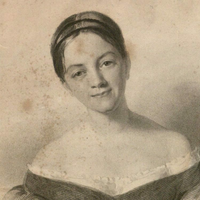The Ruined Cottage
None will dwell in that cottage; for, they say
Oppression reft it from an honest man,
And that a curse clings to it. Hence the vine
Trails its green weight of leaves upon the ground;
Hence weeds are in the garden; hence the hedge,
Once sweet with honey suckle, is half-dead;
And hence the gray moss on the apple tree.
One once dwelt there, who, in his youth,
Had been a soldier; and, when many days
Had passed, he sought his native village,
And sat down, to end his days in peace.
He had one child, a little laughing thing,
Whose dark eyes, he said, were like her mother’s,
She had left buried in a strange land.
And time went on in comfort and content;
And that fair girl had grown far taller
Than the red-rose tree, her father planted
On her first English birth-day. He had trained it
Against an ash, till it became his pride,
It was so rich in blossom and in beauty.
It was called the tree of Isabel. ’Twas an appeal
To all the finer feelings of the heart
To mark their quiet happiness; their home,
In truth, the house of love; and, more than all,
To see them on the Sabbath, when they came,
Among the first, to church. And Isabel,
With her bright colour and her clear blue eyes,
Bowed down so meekly in the house of prayer;
And, in the hymn, her sweet voice audible.
Her father looked so fond of her, and then,
From her looked up so thankfully to heaven.
Then their small cottage was so very neat,
Their garden filled with fruits and flowers and herbs;
And in the winter there was no fireside
So cheerful as their own.
But other days
And other fortunes came - and evil power;
They bore against it cheerfully, and hoped
For better times; but ruin came at last,
And the old soldier left his dear home,
And left it for a prison. ’Twas in June,
One of June’s brightest days; the bee, the bird,
The butterfly, were on their lightest wings;
The fruits had their first tinge of summer light;
The sunny sky, the very leaves seemed glad;
But the old man looked back upon his cottage,
And wept aloud. They hurried him away,
And the dear child, that would not leave his side!
They led him from the sight of the blue heaven
And the green grass, into a low dark cell,
The windows shutting out the blessed sun
With iron grating; and, for the first time,
He threw him on the bed, and could not hear
His Isabel’s good night.
But the next morn
She was the earliest at the prison gate,
The last on whom it closed, and her sweet voice
And sweeter smile made him forget to pine.
She brought him every morning fresh wild flowers,
But every morning he could mark her cheek
Grow paler and more pale, and her low tones
Get fainter and more faint; and a cold dew
Was on the hand he held. One day he saw
The sun shine through the grating of his cell,
Yet Isabel came not. At every sound
His heart-beat took away his breath;
Yet still she came not near him. One sad day
He marked the dull street, through the iron bars,
That shut him from the world. At length,
He saw a coffin carried carelessly along;
And he grew desperate. He forced the bars;
And he stood on the street, free and alone.
He had no aim, no wish for liberty;
He only felt one want - to see the corpse,
That had no mourners. When they set it down,
Ere it was lowered into the new-dug grave,
A rush of passion came upon his soul;
He tore off the lid, and saw the face
Of Isabel, and knew he had no child.
He lay down by the coffin quietly -
His heart was broken!

